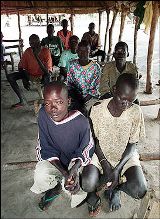Southern Sudan receives $ 27 mln for health and education
Dec 3, 2005 (JUBA) — The internationally assisted recovery of war-torn Southern Sudan got underway with a US$27 million program to rebuild health and education services, and support basic government functions.
 The Rapid Impact Emergency project, signed on November 24 consists of a US$20 million grant from the Multi-Donor Trust Fund (MDTF) for Southern Sudan plus US$7.25 million from the Government of Southern Sudan (GoSS).
The Rapid Impact Emergency project, signed on November 24 consists of a US$20 million grant from the Multi-Donor Trust Fund (MDTF) for Southern Sudan plus US$7.25 million from the Government of Southern Sudan (GoSS).
The World Bank (WB) is administrator of the trust fund, which was established as part of Sudan’s Comprehensive Peace Agreement.
The grant agreement directs that the funds be used to acquire pharmaceuticals for health centers, textbooks for primary schools, as well as equipment for GoSS offices in the regional and state capitals. The monies can also be used for procurement and accounting services required by the GoSS.
“This first commitment entered after the formation of our new government begins the process of rebuilding”, said GoSS Finance Minister Arthur Chol during a November 24 signing ceremony in Juba, which was attended by the whole cabinet and several of the MDTF’s donors.
The newly established Government of Southern Sudan faces a development challenge that is among the most formidable in the world: fully 90% of the population is estimated to be living in poverty, with one in four children likely to die before their fifth birthday.
Infrastructure needs are daunting, with road and rail transport nonexistent in much of the region. The civil service and associated management systems and institutions to oversee development programs need to be established virtually from scratch.
A second Multi-Donor Trust Fund, also administered by the Bank, will support projects organized by the national government of Sudan, with a focus on decentralization, consolidating the peace agreement, and poverty programs.
Ishac Diwan, World Bank Country Director for Sudan, said, “The goal is to commit about US$350-400 million during the next calendar year in the areas of capacity building, roads, water, health, education, demobilization, and private sector development, with a focus on micro enterprises, and rural development.”
At a donor conference in Oslo in April 2005, countries pledged over US$500 million to the two MDTFs to help consolidate the peace agreement ending the conflict between the Government of Sudan in Khartoum and the Sudan People’s Liberation Movement in the South.
So far, US$112 million have been paid into the trust funds by the Netherlands, United Kingdom, Norway, Sweden, and Iceland.
A Sudan Consortium, established through the peace agreement and the donors’ conference in Oslo, is responsible for reviewing the overall program, including humanitarian, economic, social and institutional developments.
The Consortium, whose participants include representatives from the Sudanese governments, donor agencies, and civil society groups, will meet in February 9-11, 2006.
(WB/ST)
